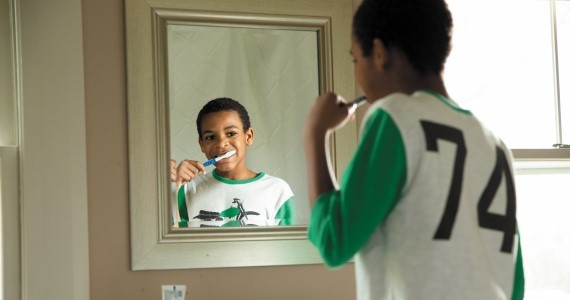Toothbrush Use and Care
Disinfecting Your Toothbrush

Brush, Brush, Brush
The American Dental Association (ADA) recommends that when you brush your teeth:
- Spend at least two minutes, twice a day
- Use fluoride toothpaste
- Use a circular motion at a 45-degree angle towards the gums
Brushing not only helps freshen the breath, it removes plaque, a thin film of food debris and bacteria that can lead to tooth decay and gum infection.
Toothbrush Care
Your choice of a toothbrush is based on personal preference. However, when selecting one, look for the ADA Seal of Acceptance. Electric or manual, a toothbrush has two ends: bristles and handle. The bristles end should be soft and the handle easy to grasp. The Centers for Disease Control and Prevention (CDC) recommends replacing a toothbrush every three to four months or whenever the bristles appear worn out. This means, you may have to replace your toothbrush in-between visits to your dentist.
Follow these steps to keep your toothbrush clean:
- Do not share your toothbrush.
- Rinse after each use to remove left over toothpaste and food caught in the bristles.
- Store it in an upright position with the bristles up. Avoid covering or storing it in a closed container.
- Allow it to air dry after each use.
- If more than one toothbrush is kept in the same holder, be sure they do not touch each other.
Keeping your toothbrush clean helps you maintain a healthy smile and extends the life of the brush.
How Brushing Can Cause Damage
Using an improper brushing technique can cause damage to your teeth and gums. Brushing too vigorously, applying too much pressure when brushing, or using a medium- or hard-bristled toothbrush can cause:
- Gum recession
- Tooth sensitivity
- Premature wear or other damage to tooth enamel
If the bristles on your toothbrush are splayed (bent or fanned out), it is likely that you're brushing too hard. Talk with your dentist if you're experiencing tooth sensitivity or gum recession so the issue can be addressed.
Note: The information in this document is not meant to replace the advice of your dentist or another licensed healthcare professional. Talk to your dentist for any specific dental advice.






